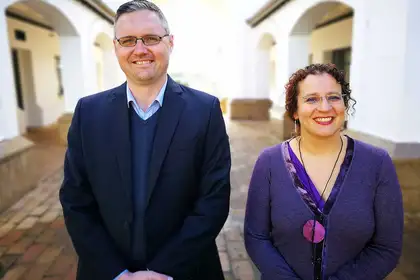
Dr David Rafferty and Dr Anastasia Bakogianni will discuss what we can learn from the Ancients about creating communities.
Democracy and citizenship are ancient ideas, still evolving in our time. Massey University Classical Studies specialists will share insights on how outsiders were integrated into Ancient Greek and Roman societies and explore parallels and pointers for today’s world.
Athenian native Dr Anastasia Bakogianni will focus her part of next week's (August 30) Our Changing World lecture on the city of her birth, where the role and treatment of migrants in a bygone era offers fascinating lessons – especially for residents of migrant magnet, super-diverse Auckland.
During Athens’ Golden Age in the fifth century BCE (Before Common Era), “many people moved to Athens because of its booming economy. It was the centre of an empire based on its naval prowess. You could say that they were economic migrants.”
Athenians welcomed these migrants; “who had something to offer – skills, wealth, connections – a bit like New Zealand’s point system,” Dr Bakogianni says.
“The Athenians also felt that they had to help those who asked. Sometimes that was entirely out of self-interest – they got involved in the wars of others as a means of enlarging their sphere of influence, but it was also a principle enshrined in their ‘history’, or what we would call their mythical past. In Greek tragedy, for example, there are what we could call refugee plays that deal with Athens accepting asylum seekers, even if this means putting Athenian lives on the line. The Athenians prided themselves on giving aid to those who needed help.”
In Ancient Rome it was more about turning freed slaves into citizens and soldiers, says her School of Humanities colleague, Dr David Rafferty.
“In the Ancient World, a higher population was always a good thing,” he says. “More people, especially those with their own land, meant more soldiers, and more soldiers meant a better chance of winning at war rather than losing.”
But not all ideas from the Ancient World are positive. One important term we get from the Greeks is ‘xenophobia’. Its modern meaning is; ‘dislike of or prejudice against people from a different country.’
“In Greek ‘xenos’ means ‘stranger’,” says Dr Bakogianni. “In The Odyssey (Homeric epic poem) Odysseus is the famous stranger seeking help from the Phaeacians (a seafaring peoples) in order to finally get home after 20 years fighting at Troy and wandering the Mediterranean. They help him get back to Ithaca, but they are punished for doing so by the god Poseidon who holds a grudge against the hero for killing his son Polyphemus.”
Rich insights into the human condition
The scholars, who will include material from classical texts – from Sophocles to Cicero, Herodotus to Virgil – believe studying the Ancient World offers rich insights into the human condition.
“Ancient writers tend to be quite frank about the problems they face and how they deal with them,” says Dr Rafferty. “They’re less bothered by dressing up their self-interested actions in a moral cloak. That makes it much easier for students to discuss the issues themselves. Also, because most ancient states were democracies, in a broad sense, which eventually collapsed, they help us confront the fragility of our own democracy. The Ancient World can be both a warning and an inspiration.”
“Many of our ways of looking at and understanding the world today have their roots in classical antiquity,” says Dr Bakogianni. “The advantage is that we can use Ancient Greece and Rome to interrogate modern ideas and biases. It is sometimes easier to do so using the remote past than by getting embroiled in the bitter divisions of the present.”
“The classics,” she adds, “are fun and evergreen. People are still talking about the Ancient Greeks two millennia plus after. This ongoing conversation and the fact that they are now a global phenomenon is another good reason to engage with them, for the sake of intellectual curiosity, if nothing else.”
The lecture is the seventh of ten in the series organised by the College of Humanities and Social Sciences this year.
BIOS:
Anastasia Bakogianniis a Hellenist who specialises in ancient Greek drama. She arrived at Massey in 2016 and is currently working on her second book about the Greek tragic heroine Antigone. She is originally from Athens, but is now a metic (foreigner living in an ancient Greek city who had some privileges of citizenship) in 21st century New Zealand.
David Rafferty is a Roman historian who has taught at Massey since 2017. His first book, on Roman political institutions, will be published at the end of the year.
Lecture details:
Whose community? What can the Ancients teach us about merging and mixing?
Thursday 30 August: 6.30pm | Sir Neil Waters Building SNW300